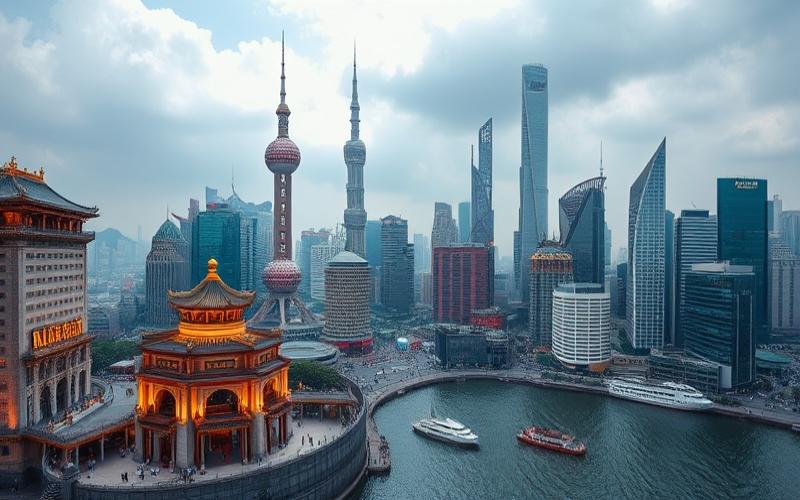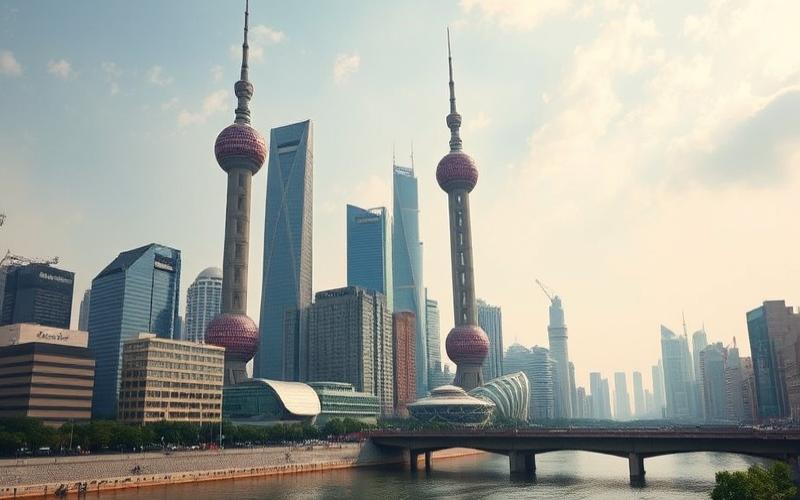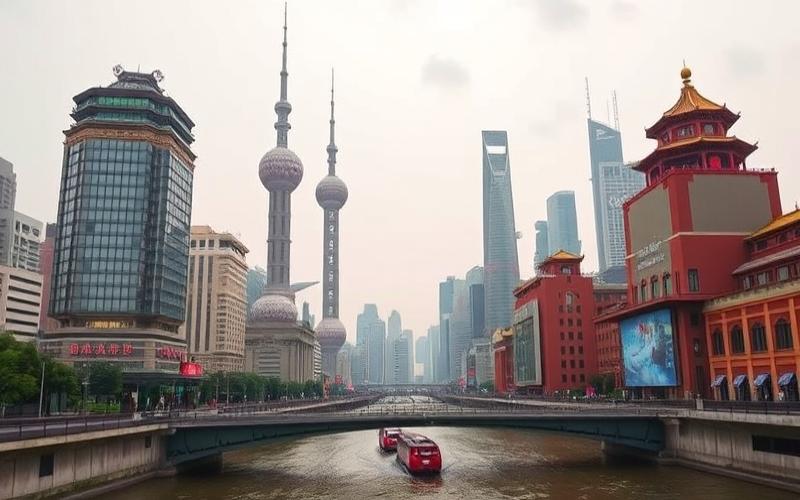
 Published on and written by Cyril Jarnias
Published on and written by Cyril Jarnias
Relocating to China as a European expatriate can be an adventure filled with unique challenges and opportunities, where cultural and administrative differences are inevitable. However, being a citizen of an EU member country offers a series of significant advantages in this context.
Expatriates can benefit from specific rights and freedoms that facilitate their integration and daily life. This article examines the various advantages available to European citizens in China, highlighting crucial aspects such as legal protection, access to consular services, and work opportunities within a framework that respects international standards.
Discover how your European status can not only simplify your transition but also enrich your expatriate experience in one of the world’s most dynamic countries.
EU Advantages for Expatriates in China
European expatriates benefit from numerous advantages thanks to EU membership when living in China, particularly regarding bilateral agreements, diplomatic and community support, and specific rights guaranteed by European treaties.
EU-China Bilateral Agreements and Partnerships Facilitating Mobility
- The European Union has signed several agreements with China aimed at simplifying mobility for European citizens, particularly in trade, scientific research, and education.
- Joint programs exist to facilitate academic exchanges (Erasmus+, academic partnerships), allowing European students easier access to Chinese institutions.
- Economically, these agreements also promote the establishment of European businesses in China and offer more professional opportunities for expatriates.
| Field | Advantage for EU Expatriates | Concrete Example |
|---|---|---|
| Studies | Easier access to universities | Erasmus+ programs |
| Work | Partial recognition of degrees | Preferred recruitment in European companies based in China |
| Mobility | Streamlined administrative procedures | Visa agreements for qualified personnel |
Enhanced Consular and Diplomatic Protection
- EU citizens can seek assistance from any embassy or consulate of a member state in case of difficulty (lost passport, legal or health issues), in accordance with the principle of mutual consular protection guaranteed by European treaties.
- The coordinated presence of European delegations often enables rapid intervention during local or international crises. For example: at the start of the COVID-19 pandemic, several European embassies jointly organized the repatriation of stranded expatriates.
European Community Network in China
Major Chinese cities host significant European communities, greatly facilitating social and professional integration: Franco-Chinese clubs, local European chambers of commerce.
Associative networks (linguistic/cultural groups) provide quick access to reliable local information as well as moral or logistical support (housing/job search).
List of Concrete Benefits from the EU Network:
- Sharing of legal and practical information
- Regular organization of cultural events
- Support during complex administrative procedures
Rights Guaranteed by European Treaties
Nationals benefit from:
- Extended consular protection rights
- Fundamental freedoms recognized in all international situations
- Simplified recourse against certain discriminations
For example: an Italian citizen involved in a commercial dispute can seek assistance not only from the Italian consulate but also from the local European diplomatic service; they can also appeal to the European Ombudsman if their fundamental rights are violated.
Concrete Examples of EU Intervention:
- Collective repatriation during health crises through joint efforts of French, German, and Spanish embassies
- Legal assistance provided following arbitrary arrest via coordination between local European delegation and partner NGOs
In summary: living in China as a European citizen offers a secure framework, easier access to professional/educational opportunities, and enhanced protection thanks to the collective institutional weight carried by the European Union.
Good to Know:
For European expatriates in China, EU membership offers various crucial advantages, particularly through bilateral agreements facilitating mobility, work, and study, such as the EU-China strategic partnership that simplifies visa acquisition and professional qualification recognition. EU citizens also benefit from enhanced consular and diplomatic protection, with dedicated services offering assistance when needed, as during the COVID-19 pandemic when the EU organized repatriations. European treaties guarantee fundamental rights and freedoms that expatriates can leverage, ensuring a secure and supported framework. Finally, expatriates can rely on a strong community network, promoting integration and mutual support among European nationals in China.
Freedom of Movement and Professional Opportunities
Bilateral Agreements Facilitating European Citizen Mobility
The European Union and China have negotiated cooperation agreements, including the Comprehensive Agreement on Investment (CAI), aimed at facilitating European businesses’ and professionals’ access to the Chinese market. This agreement provides for increased openness in several sectors (financial services, telecommunications, healthcare, logistics) and harmonization of investment rules, which should allow for better predictability and reduced regulatory barriers for European nationals wishing to work in China. However, the implementation of this agreement still depends on ratification by the European Parliament and remains subject to the evolving geopolitical context.
Growth Sectors Open to European Expatriates
The following sectors offer real professional opportunities for European expatriates in China:
- Technology: artificial intelligence, cybersecurity, fintech, software development.
- Education: foreign language teaching, management, scientific fields in universities and international schools.
- International trade: trade management, logistics, business development for European companies established in China.
- Healthcare and research: private hospitals, international clinics, research laboratories.
- Financial services: banking, insurance, investment consulting.
Cultural and Economic Differences Impacting Employment
European expatriates must contend with:
- A very vertical corporate hierarchy and a different relationship with authority than in most European countries.
- The importance of “guanxi” (personal relationship networks) in contract negotiation and career management.
- Different expectations regarding work pace, availability, and professional flexibility.
- A job market where national preference remains strong for certain positions, despite increasing openness.
Examples of Support Programs and Initiatives
- European chambers of commerce in China (e.g., EU Chamber of Commerce in China) organize recruitment forums, integration workshops, and mentorship programs.
- Certain member states (France, Germany, Netherlands) have specific agreements promoting young professionals’ mobility or temporary recognition of certain qualifications.
- Erasmus+ programs for internships or academic exchanges with China help enhance the employability of young European graduates.
Challenges Related to Professional Qualification Recognition
- European degrees and certifications are not always automatically recognized in China, particularly in regulated sectors (medicine, law, engineering).
- It’s often necessary to translate and authenticate diplomas through complex administrative procedures.
- To overcome these obstacles, expatriates can:
- Prioritize less regulated sectors or European companies established locally.
- Rely on consular networks and chambers of commerce for up-to-date information on recognition procedures.
- Participate in continuing education programs or internationally recognized certifications in China.
Freedom of Movement Within the EU vs. Restrictions in China
| Aspect | European Union | China |
|---|---|---|
| Freedom of movement | Total for EU citizens | Subject to visa and work permits |
| Qualification recognition | Facilitated via EU directives | Specific, non-automatic procedures |
| Labor market access | Non-discriminatory | Frequent national preference |
| Career planning | High intra-European mobility | Mobility dependent on Chinese migration policy |
Freedom of movement within the EU allows for seamless professional mobility, promoting access to a vast labor market and flexible career planning. In contrast, administrative and regulatory restrictions in China require specific anticipation and management of procedures for European expatriates.
Important text: European expatriates in China benefit from real opportunities in certain sectors but must adapt to a specific regulatory and cultural environment, relying on European support mechanisms and anticipating qualification recognition procedures.
Good to Know:
Bilateral agreements between the European Union (EU) and China simplify visa and work permit procedures for European citizens, although restrictions may exist compared to freedom of movement within the EU. Booming sectors in China, such as technology, education, and international trade, offer numerous professional opportunities for European expatriates, who must however adapt to cultural and economic differences impacting employment prospects. Initiatives like the Erasmus program for young entrepreneurs or targeted educational partnerships facilitate professional mobility, while qualification recognition can be an obstacle, requiring consultation with specialized services to validate skills. It’s crucial to plan one’s career considering China’s movement restrictions compared to the EU, thus optimizing benefits related to international professional mobility.
European Rights vs. Chinese Laws
Fundamental Differences Between European and Chinese Legal Frameworks
The European legal framework is distinguished by the primacy of human rights, freedom of expression, and strong personal data protection, while the Chinese system prioritizes social stability and national sovereignty, often at the expense of these same rights.
Main Features of European Law:
- Respect for democracy: European institutions place democracy, citizen participation, and separation of powers at the heart of their functioning.
- Rule of law: All public action is framed by law, with independent judicial control.
- Individual freedoms: Including freedom of expression, association, religion, and respect for privacy.
- Personal data protection: Strict application of GDPR (General Data Protection Regulation), guaranteeing a high level of control for citizens over their personal information.
Principles of Chinese Law:
- Primacy of social stability: Maintaining public order and state security often take precedence over individual freedoms.
- National sovereignty: China considers any criticism of human rights as an infringement of its sovereignty and refuses external interference.
- Restricted freedom of expression: Speech deemed contrary to stability or critical of the government can lead to criminal or administrative sanctions.
- Data control: Personal data may be used by the state for security or surveillance reasons, without the same guarantees as in Europe.
| Theme | Europe (EU) | China |
|---|---|---|
| Human rights | Inalienable, universal, protected by treaties | Subordinate to stability and national interest |
| Freedom of expression | Broad, framed by law | Restricted, controlled by the state |
| Data protection | GDPR, individual consent and control | Extended state access, weak individual control |
| Justice | Independent, access to recourse | Subject to the party, predominant administrative justice |
| Democracy | Pluralistic system, free elections | Single party, centralized political control |
Concrete Examples of Legal Conflicts:
- Freedom of expression: A European national criticizing the Chinese government on social media, even from China, may be expelled or prosecuted, which would be unacceptable in Europe.
- Data protection: European companies operating in China are required to store certain data on local servers accessible to authorities, contradicting GDPR.
- Protest rights: Participation in a peaceful protest in Hong Kong or elsewhere may lead to arrest or expulsion for a European expatriate, whereas such a right is protected in Europe.
European Union Support for Expatriates:
Main Mechanisms and Available Resources:
- Consular services: Embassies and consulates offer legal assistance, advice, and support in case of disputes or arrests.
- Institutional dialogue: The EU maintains regular dialogue with China on human rights, even if these discussions don’t always lead to concrete progress.
- Sanctions and diplomatic pressure: The EU has adopted targeted sanctions against Chinese officials involved in human rights violations.
- Information and alerts: Provision of guides, warnings, and official recommendations for European nationals in China.
- Mediation in case of conflict: Possible intervention to ensure fair treatment or organize repatriation.
Examples of Support:
- Legal assistance in case of arrest for reasons related to freedom of expression.
- Diplomatic interventions in case of arbitrary detention or passport confiscation.
- Organization of information meetings on risks related to Chinese legislation.
Good to Know:
European rights, which advocate democracy, the rule of law, and individual freedom, can clash with restrictive Chinese laws, particularly regarding freedom of expression and personal data protection. In China, censorship is widespread, contrasting sharply with the European right to free expression. Moreover, Chinese cybersecurity regulations impose strict controls and increased surveillance, conflicting with the EU’s General Data Protection Regulation (GDPR). The European Union supports its expatriate nationals through mechanisms like the European External Action Service, offering assistance and resources in case of legal conflict. For example, in disputes related to online freedom of expression, the EU can provide legal support to mitigate the impacts of Chinese censorship. Expatriates can also turn to consular services for advice and help when confronting local laws, thus ensuring some protection of their fundamental rights while living abroad.
Comparison of EU and China Freedoms for Expatriates
Expatriates in the European Union benefit from broadly protected civil and political rights under laws and international conventions, while in China, these freedoms are restricted by strict state regulations and increased surveillance.
| Freedom | European Union (EU) | China |
|---|---|---|
| Expression | Protected by the EU Charter of Fundamental Rights. Expatriates can freely criticize governments, protest in public or online. Ex: Public demonstrations in Paris or Berlin open to foreigners. | Very limited. Repressive laws prohibit criticism of the government, even for foreign residents. Foreign artists, intellectuals, and activists have been arrested or expelled for expressing their opinions. |
| Press | Guaranteed media plurality; access to all international information sources without systematic censorship. Ex: an expatriate can publish a political blog without particular legal risk except incitement to hatred or defamation. | Controlled or censored: restricted access to many international media (BBC, NYT blocked). Foreign journalists are monitored; their work is limited especially in regions like Xinjiang. |
| Religion | Total freedom of religious practice in accordance with local laws; active presence of multicultural communities (mosques, Russian Orthodox churches for expatriates in Germany/France). | Religious exercises heavily monitored especially in autonomous regions (Xinjiang/Tibet), with arbitrary closure of places of worship and possible arrest during unauthorized community activities. |
| Assembly & Association | Guaranteed right to organize public/political/cultural gatherings subject to public order respect. Active foreign associations throughout the EU (professional clubs, charitable associations). | Subject to strict prior authorization; any gathering deemed “subversive” may lead to arrest/mass arrests during unauthorized events (ex: Tiananmen commemoration). |
Concrete Examples
- French expatriate living in Spain testifies to being able to freely participate in a local feminist demonstration without restrictions or harassment.
- German engineer based in Shanghai reports having to limit his discussions on WeChat after his account was temporarily suspended following the sharing of an international article criticizing the Chinese government.
- Swedish student group organizing an LGBTQ+ forum in Poland, officially welcomed despite some local heated debates but never banned.
Digital Regulation
- EU: Respect for GDPR guaranteeing personal data confidentiality including for expatriates; near-total internet freedom except specific cases related to terrorism or extremism.
- China: Widespread surveillance via the Great Firewall; severe restrictions on VPNs and international platforms; content deemed “sensitive” automatically removed even if shared by foreign residents.
Legal/Social Treatment
- EU: Foreign residents have access to fair legal recourse against discrimination/police misconduct via independent courts.
- They can freely form professional/cultural associations recognized administratively upon arrival.
- China: Foreign residents sometimes subject to the same strict controls as Chinese citizens regarding expression/social networking/digital publications;
- Increased risk when involved in unapproved associative/political or religious activities.
Potential Advantages for an Expatriate Living in the EU:
- Assured access to fundamental civil liberties
- Extended consular protection thanks to bilateral agreements between member states
- Open internet facilitating international social/professional exchanges
- Independent judicial system protecting against administrative abuses
In direct comparison with the current Chinese situation – marked by permanent digital/social surveillance and frequent criminalization of activism – living in the European Union therefore offers superior guarantees in terms of civil and political rights, which favors both personal and professional development for expatriates wishing to actively engage within their host society.
Good to Know:
Expatriates in the European Union benefit from broad civil and political freedoms, including freedom of expression, press, religion, as well as the right to assemble and associate, governed by laws such as the EU Charter of Fundamental Rights. In comparison, China imposes significant restrictions in these areas, with strict media and internet censorship, and limitations on religious practice. For example, European expatriates in France can participate in demonstrations and freely express their opinions, while in China, these activities are often limited or monitored. These differences are also visible in the digital domain, where Chinese regulation, including the “Great Firewall,” limits information access for foreigners. Expatriate testimonies reveal that living in the EU offers a more open and secure legal and social framework, with increased recognition of individual rights, making the European Union potentially more attractive for those who value personal freedom.
Disclaimer: The information provided on this website is for informational purposes only and does not constitute financial, legal, or professional advice. We encourage you to consult qualified experts before making any investment, real estate, or expatriation decisions. Although we strive to maintain up-to-date and accurate information, we do not guarantee the completeness, accuracy, or timeliness of the proposed content. As investment and expatriation involve risks, we disclaim any liability for potential losses or damages arising from the use of this site. Your use of this site confirms your acceptance of these terms and your understanding of the associated risks.

























































